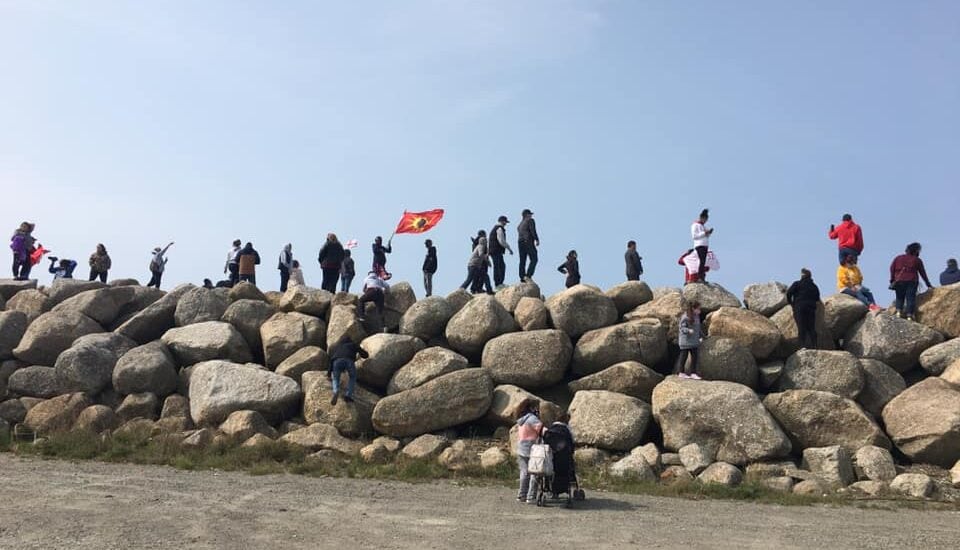
KJIPUKTUK (Halifax) – Politicians and the leadership of non-Indigenous fishermen are allowing tensions between Indigenous and non-Indigenous fishers in Digby County to rise to dangerous levels.
This is what happens when land acknowledgements are just things you say at the start of meetings, and when the term ‘unceded’ is devoid of real meaning.
What’s playing out in the waters off Digby is complex, but the bottom line is that both non-Indigenous fishermen and the Department of Fisheries and Oceans are trying to stop Mi’kmaq from exercising their treaty rights.
That right was recognized by the Supreme Court when it confirmed in its September 1999 Donald Marshall Jr. decision that established that Indigenous fishers have the right to fish out of season to earn a moderate livelihood.
Like it or not, that’s the law now.
That governments ever since delayed accommodating that right in public policy is not something we can fault the Mi’kmaw fishers for, and it is no wonder that after 20 years of government non-action impoverished First Nations are tired of waiting.
Yesterday, on the 21st anniversary of the Marshall decision, the Sipekne’katik First Nation launched its own modest self-regulated fisheries from the dock in Lower Saulnierville, in Digby County, only to be met with violence by non-Indigenous fishermen.
As Lori Oliver argued on these pages, anti-Indigenous racism is very much part of what’s happening on the water. How could it not? It’s been a pervasive part of Nova Scotia culture for hundreds of years.
Reports of blockades and vandalism, and images of yesterday’s events are downright scary.
Government, media and fishermen’s leadership should do what they can to de-escalate the conflict, but unfortunately not enough of that is happening.
The media continues to report on Mi’kmaq fisheries as illegal, unwilling to recognize that the Mi’kmaq Nation is equal to Canada in its sovereignty, and just as justified to consider DFO’s efforts to interrupt their fisheries illegal.
Meanwhile Colin Sproul, of the Bay of Fundy Inshore Fishermen’s Association, told the CBC that “In the absence of law and order good people can be forced to take the law into their own hands and the responsibility for that falls squarely on Minister Jordan and her predecessors who have not enforced the rules.”
That’s a dangerous statement, given how volatile the situation is. What’s happening right now reminds me of the lead-up to the Burnt Church crisis. Check out the excellent (free!) NFB documentary Is the Crown at War With Us? by Alanis Obamsawin if you doubt how quickly these things can escalate.
Sproule argues that this conflict isn’t about Indigenous fishermen trying to make a living, but, as he states in a Facebook post, that “a majority of the Chiefs, no matter their public assertions are intent and currently negotiating to gain more commercial fishery access that they can lease out to non-indigenous fishing companies for immediate returns.
I don’t know what’s happening inside the negotiation rooms, but what we clearly see on the ground, or rather, on the waves, are Indigenous fishermen trying to make a modest living, setting out their 50 traps, while supported by a leadership with grassroots credentials. To argue otherwise is patronizing in its suggestion that these fishermen are mere pawns in a political game of chess.
Meanwhile, federal Fisheries minister Bernadette Jordan continues to insist that there must be a DFO-made management framework, while going out of her way not to charge the fishermen, fearing that yet another court decision will further erode the government’s powers.
Let’s trust Sipekne’katik First Nation and the Mi’kmaw fishers who have put in place their own processes to exercise their treaty rights and self-manage a moderate and sustainable fisheries.
After all, it’s a mere drop in a bucket in the context of the overall lobster fisheries off Nova Scotia’s shores. And more importantly, it’s the right thing to do.
See also: Book review: Living Treaties. Narrating Mi’kmaw Treaty Relations
With a special thanks to our generous donors who make publication of the Nova Scotia Advocate possible.
Subscribe to the Nova Scotia Advocate weekly digest and never miss an article again. It’s free!




Everyone has the right to fish no matter who u r this includes m’qmawk
I disagree. Not everyone has the right to fish. If you have the proper licensing and a proper business permit, than maybe you should have access to fish out at sea.
Off the coast though, those are traditional Mikmaq hunting/fishing areas. This is THEIR land, not ours. We’ve borrowed it from them, but the ones who come from that land and that coast are the indigenous. They’ve been the caretakers for the past 30,000 years.
If they want to exercise their treaty rights give them the coast. That’s not even asking much.